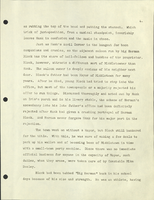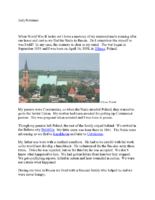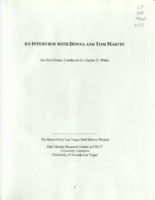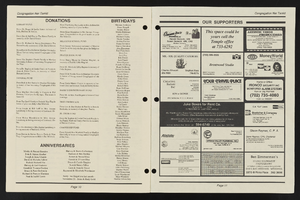Search the Special Collections and Archives Portal
Search Results

Correspondence and synopsis for Good Ole Hank, television series proposal, June 1955
Date
Archival Collection
Description
The manuscript synopsis for the television series Good Ole Hank is accompanied by a letter from Harry Cohn of Columbia Pictures (Hollywood, Calif.), rejecting the proposal.
Text

Oscar and Carolyn Goodman oral history interview: transcript
Date
Archival Collection
Description
Oral history interview with Carolyn G. and Oscar B. Goodman conducted by Claytee D. White on October 18, 2014 for the Southern Nevada Jewish Heritage Project. In this interview, Carolyn G. and Oscar B. Goodman discuss their early childhoods and education. They tell the story of their marriage, family life, and careers. The Goodmans go into further detail on the growth of Las Vegas, Nevada as a community as well as a tourist destination.
Text

Transcript of interview with Esther Toporek Finder by Barbara Tabach, June 8, 2016
Date
Archival Collection
Description
Esther Toporek Finder is a professor of psychology and has lived in Las Vegas, Nevada since 2010. She was born May 28, 1953, in Chicago, Illinois, and moved to Washington D.C. in 1979 after graduating with her Masters from the University of Chicago. While in Washington D.C, Finder was able to jump start her career as an oral historian recording Holocaust survivor stories with the U.S Holocaust Memorial Museum and the Shoah Foundation. Esther Finder is a second generation Holocaust survivor. Her passion for Holocaust education and its representation in society has led her to many opportunities to teach, facilitate, educate, create and contribute to many survivor oriented groups such as The Generation After where she was President for 15 years, the Holocaust Era Assets Conference as representation of the American survivor community, as well as the creation of the Generations of the Shoah International group in October 2002. When Finder moved to Las Vegas, she quickly and deeply involved herself in the Las Vegas Holocaust survivor community. She has been integral with Nellis Air Force Base?s Days of Remembrance, the opening the Generations of Shoah Nevada Chapter, and partnering with the World Federation of Jewish Child Survivors of the Holocaust and Descendants to bring conferences to the Las Vegas Valley. In addition, she has been an organizer of commemoration programs for students attending UNLV and schools within the Clark County School District. Her involvement with the Governor?s Advisory Council on Education Relating to the Holocaust and the television series Eyewitness to History have highlighted the Holocaust survivors living in Las Vegas. In this interview, Finder discusses her childhood as well as the paths that led her to realize her passion for the Holocaust survivor community and her deep association with the community. She shares her experiences interviewing survivors and second generation survivors giving a deeper insight into the stories that they have shared with her over the years. In addition, she reflects on her long reach within the survivor community and brings to light the foundation of family being a survivor gives. Finder highlights the traveling, teaching and community service opportunities she has had over the years while enlightening people about the importance of countering hate through education.
Text

Transcript of interview with George Gilbert by Ruth Guidi, February 10, 1975
Date
Archival Collection
Description
On February 10, 1975, Ruth Guidi interviewed George Gilbert (born 1931 in Southgate, California) about his life in Nevada. George first talks about his education in Las Vegas and his family background. He also talks about times during World War II, the shopping facilities available to those in Las Vegas, the casinos that existed, the churches that were built, and the Helldorado parades. The two also discuss social clubs, politics, the atomic testing, environmental and social changes, the Mormon Fort, Hoover Dam, and the first movie theaters.
Text
Howard Hughes Public Relations Reference Files
Identifier
Abstract
The Howard Hughes Public Relations Reference Files (1931-1997) were compiled by Richard "Dick" Hannah, vice-president of the Los Angeles public relations firm Carl Byoir & Associates, which was hired to direct public relations for Hughes’ companies. The collection is primarily composed of newspaper clippings organized into reference files. A significant number of the files contain articles about Howard Hughes’ personal life, the operations of his companies, and legal and political disputes involving Hughes and his companies. The files also document a range of other subjects related to his business ventures, including aviation, aerospace, defense industries, motion picture studios, film stars, communism in Hollywood, and the House on Un-American Activities Committee (HUAC). Later in life Hughes became obsessed with how he was being portrayed in the media. In addition to collecting magazine articles, newspaper clippings, transcripts, screenplays, and books that referenced him. He also collected newspaper clippings about the activities of print media outlets, columnists, radio-television stations, current and former employees, and competitors. The collection also contains newspaper clippings about Watergate, organized crime, gambling, and Las Vegas and contains press releases, correspondence and records generated by Carl Byoir & Associates as well as Rosemont Enterprise, Inc.
Archival Collection

Biographical essay by Judy Newman, 2014
Date
Archival Collection
Description
Judy Newman describes her early life in an orphanage in Poland, and went to Israel in the 1950s, where she met her husband.
Text

Transcript of interview with Tom and Donna Martin by Claytee White, January 31, 2013
Date
Archival Collection
Description
Hailing from Indiana and California, Donna Guiffre Martin and Tom Martin came to Las Vegas in the early 1950s as their parents sought new opportunities. Donna's father, Gus Guiffre, quickly established himself as a local television personality, while Tom's father took on a variety of entrepreneurial opportunities. Like many of the young people in Las Vegas, Donna and Tom enjoyed riding around town; horse-back riding; football games; Helldorado - and, of course, Rancho High School. This interview covers both Donna and Tom's early years before their moves to Las Vegas, as well as their memories of first homes, childhood experiences, early adulthood and their current lives.
Text



